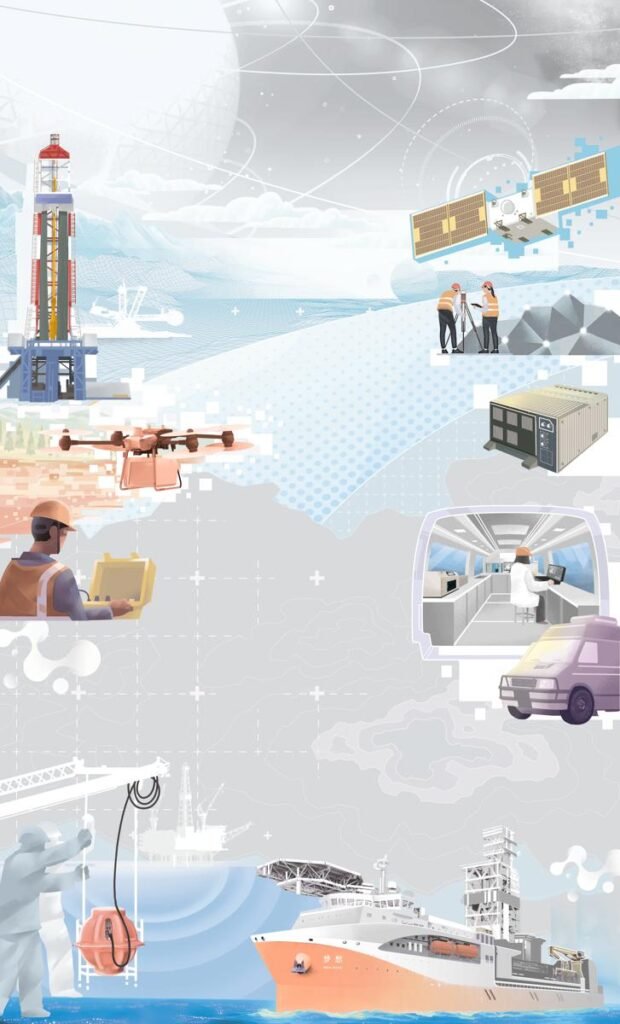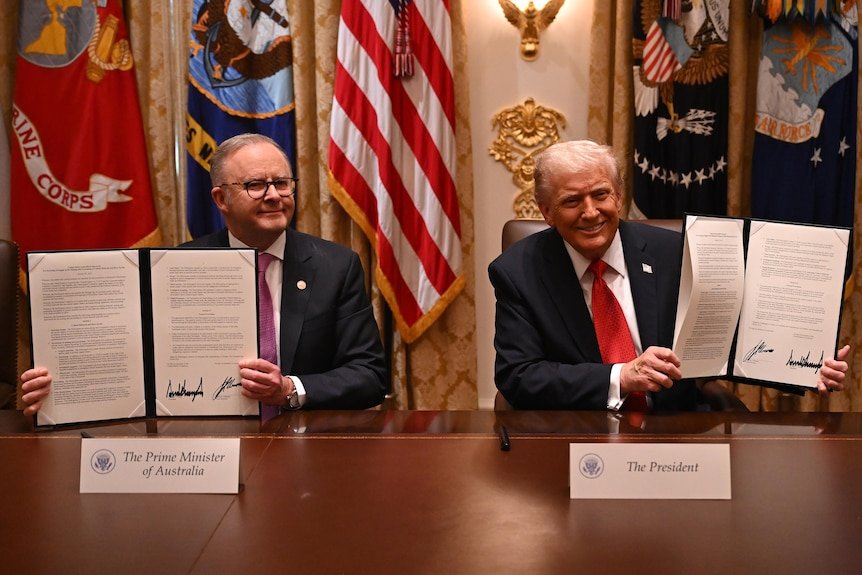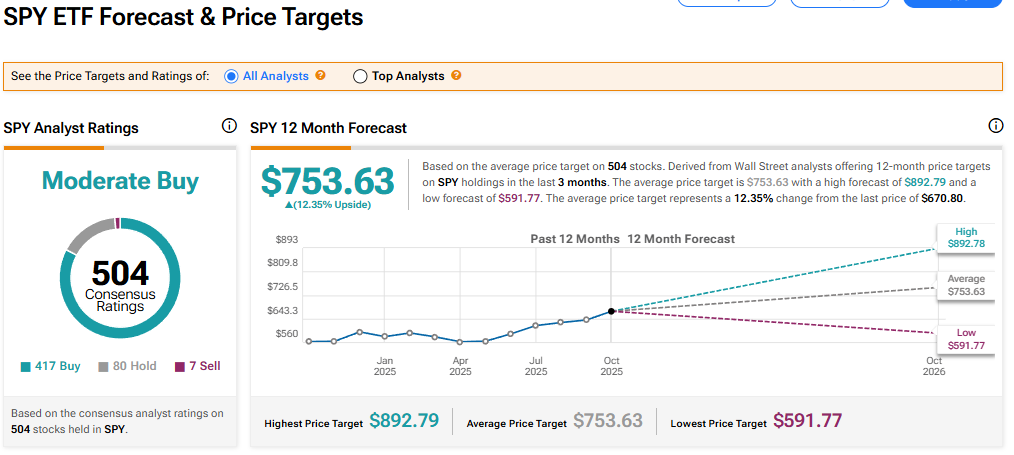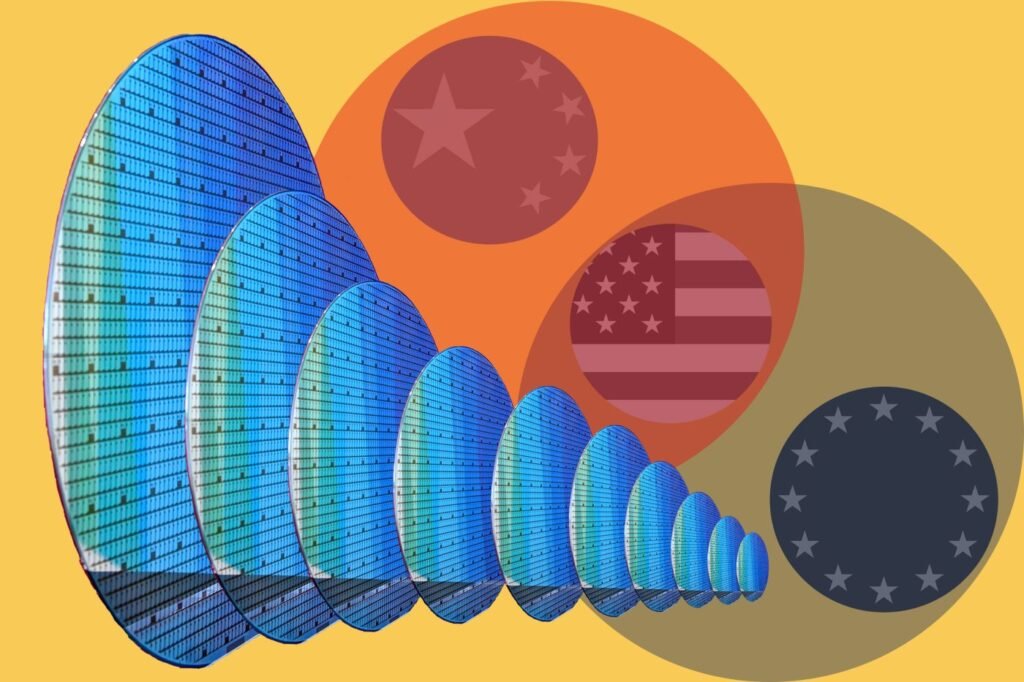For all the celebration of Anthony Albanese’s friendly visit to the White House and the happy news on AUKUS and critical minerals, there was something Donald Trump said that alarmed strategic analysts. And it had nothing to do with disliking Kevin Rudd.
The US president’s sunny optimism on China’s intentions towards Taiwan and his confidence in America’s military superiority struck a worrying note.
“China doesn’t want to do that,” the US president declared, when asked by an Australian journalist whether Xi Jinping wanted to invade Taiwan. “I don’t see that at all with President Xi. I think we’re going to get along very well as it pertains to Taiwan and others.”
Donald Trump does not think Xi Jinping is willing to pull the trigger on a conflict that could drag the world’s two biggest powers into war. (Reuters: Damir Sagolj)
Trump relaxed about prospects of war
It was a rare glimpse into Trump’s thinking on the biggest strategic question for this region. The US president does not think his Chinese counterpart is willing to pull the trigger on a conflict that could drag the world’s two biggest powers into a war.
What’s more, Trump seemed to frame this confidence on the grounds that “the United States is the strongest military power in the world by far, it’s not even close”.
“We have the best of everything, and nobody’s going to mess with that,” he predicted.
This benign view of China’s ambitions towards Taiwan was certainly a rejection of the dominant “China threat” narrative we’ve heard for years from many in the US and Australia, including every member of Trump’s team seated alongside him as he spoke.
Pete Hegseth, now known as the Secretary of War, has been the most alarmed at the “imminent” threat of a Chinese invasion of Taiwan.
“It should be clear to all that Beijing is concretely and credibly preparing to use military force to alter the balance of power in the Indo-Pacific,” he said in May.
Vice-President JD Vance has previously spoken about Beijing making “a real military move” against Taiwan “sooner rather than later”.
Secretary of State Marco Rubio and secretary of the navy John Phelan, also seated at the table, have issued similar warnings about China’s efforts to annex Taiwan.
They all sat mute as Trump offered a more relaxed view on the prospects of war.
Nor was the Australian prime minister willing to contradict his friend and ally after such a productive meeting. “I’m not going to comment on President Trump’s comments,” he told reporters curious if he shared Trump’s optimism about Taiwan.
This “no comment” approach has generally been a wise strategy for Albanese to avoid being drawn into the daily cycle of outrage over Trump’s latest remarks.
It’s also worth noting this president famously and regularly changes his position on issues big and small, and could have a very different line if things don’t go well when he meets Xi in South Korea at the end of next week.
But so far, Trump’s benign view on China’s intentions towards Taiwan has remained relatively consistent on the rare occasions he’s spoken about it.
That’s despite Xi’s own words and deeds.
Loading…
Xi says reunification ‘inevitable’
China’s president has repeatedly said reunification with Taiwan is “inevitable” and refused to rule out the use of force. Just this week he called for “efforts to advance” reunification as China stepped up its intimidation of Taiwan.
In recent days, Taiwan’s Ministry of Defence has reported fresh Chinese military activity around the island, including navy vessels and jet fighters approaching its territory. This “grey zone” harassment has been steadily intensifying.
Trump, however, still doesn’t think this is heading towards an actual invasion: “I don’t see anything happening.”
The US president, it must be said, could be right. For all his provocations, China’s president may still consider the costs of fighting a war over Taiwan to be too high.
Then again, Trump may be wrong, even “dangerously wrong”, as the Lowy Institute’s Sam Roggeveen puts it, writing for The Interpreter about Trump’s misreading of the military balance between the two powers.
The US still comfortably holds the title for the biggest military power in the world, but when it comes to winning a conflict in the Taiwan Strait, most defence experts agree it’s a much closer contest, possibly too close to call.
“I think Trump’s instinct is not to fight a war over Taiwan,” Roggeveen told this column. But if a crisis over Taiwan develops, and Trump, under pressure, feels he can’t backdown, “then his sense of the military balance becomes key”.
Taking on China is not the same as bombing nuclear facilities in Iran. Beijing’s regional readiness has been on show for all to see.
Roggeveen is no particular fan of AUKUS. He has warned of Australia making itself a bigger target in the event of any war by expanding the presence of US bombers and submarines here. The AUKUS deal, however, is now “full steam ahead” under Trump and Albanese.
The main concern now is Australia being locked in behind an ally that may be underestimating an enemy’s intentions and its strength.
“Some of the greatest military disasters in history can be attributed to leaders who overestimated their own strength and underestimated the enemy’s,” Roggeveen says, “as Vladimir Putin can attest”.
As he travels home, Albanese has much to celebrate from his White House success.
He would also no doubt welcome any dialling down of the temperature between the US and China. No Australian prime minister wants to see a conflict between our main ally and top trading partner.
But nor would any Australian leader want a US president to miscalculate on such a big call as Taiwan by ignoring China’s intentions or underestimating its strength.
David Speers is national political lead and host of Insiders, which airs on ABC TV at 9am on Sunday or on iview.
Loading







